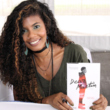As Brave As You
(Libby/OverDrive eBook, Kindle)
Available Platforms
Description
More Details
Excerpt
Similar Titles From NoveList
Similar Authors From NoveList
Published Reviews
Booklist Review
*Starred Review* Reynolds' first foray into middle-grade fiction follows the path of other stellar writers like Christopher Paul Curtis and Rita Williams-Garcia, who have brought their young protagonists home to meet the family. Our narrator is 11-year-old Genie, a worrier from Brooklyn who's headed, along with his older brother, Ernie, to his grandparents' home in backwoods Virginia. There's culture shock aplenty (no Internet, no TV), plus the more visceral earthquake of learning Grandpop is blind. And the aftershocks keep coming: Grandpop carries a gun. Genie's notebook of questions a wonderful literary technique opens wide this thoroughly realistic narrator's world of concerns and brings readers closer to him. The story's richness comes in part from its evocative descriptions of place, with every sense invited to the party. Readers don't just see the dog poop that covers the yard; they feel the weight of it as the brothers shovel it into the woods and can smell it all over the boys. But it is the intricate lacing of relationships that makes this so remarkable. There are second-, even third-generation problems being worked out between fathers and sons. A Jim Crow history has had a hand in shaping the issues, but there are also personal trials, hurt, and despair that hinder resolution. Yet through his inquisitive young protagonist, Reynolds movingly shows that although sometimes love hides, it still abides. HIGH-DEMAND BACKSTORY: Reynolds comes off the one-two punch of the 2015 award winners The Boy in the Black Suit and All American Boys as a newly branded kidlit superstar.--Cooper, Ilene Copyright 2016 Booklist
Publisher's Weekly Review
Reynolds (All American Boys) aims for a younger audience with the story of Genie and Ernie, two Brooklyn boys spending a month with their grandparents in North Hill, Va., while their parents try to mend a frayed marriage. Eleven-year-old Genie is most concerned about the lack of Internet access: how will he look up answers to the questions that constantly come to him? Ernie, nearly 14, is happy enough when he meets Tess, a neighbor who gives them the lowdown on North Hill, but neither brother has any idea that their stay will involve picking peas in the hot sun and, for Genie, keeping secrets-both his and those of his blind grandfather. Genie's efforts to fix his mistakes (including accidentally killing one of his grandfather's beloved birds), his realization that the Web doesn't have all the answers, and Grandpop's struggle with guilt and forgiveness after he pushes Ernie to participate in a dangerous family tradition create a multifaceted story that skillfully blends light and dark elements while showing children and adults interacting believably and imperfectly. Ages 10-up. Agent: Elena Giovanazzo, Pippin Properties. (May) © Copyright PWxyz, LLC. All rights reserved.
School Library Journal Review
Gr 5-8-When 11-year-old worrywart Genie and his big brother, Ernie, leave Brooklyn and go to their grandparents' home in rural Virginia, it seems as though they have been dropped on another planet. The city boys are introduced to another way of life and to their blind grandfather, who goes to extreme lengths to conceal his disability. A rich and rewarding coming-of-age story about family and courage, told with laugh-out-loud humor and a great deal of heart. © Copyright 2016. Library Journals LLC, a wholly owned subsidiary of Media Source, Inc. No redistribution permitted.
Horn Book Review
Reynolds (The Boy in the Black Suit, rev. 3/15; with Brendan Kiely, All American Boys, rev. 11/15) delivers an emotionally resonant middle-grade story of an African American family working to overcome its tumultuous past in hopes of a better future. Not-quite-teenager Genie Harris has a notebook full of questions, ranging from the superficial ("Why are swallows called swallows? did people used to eat them?") to the introspective ("Why am I so stupid?"). But there is no question as to why he and his older brother Ernie find themselves far from their Brooklyn home with their Grandma and Grandpop in rural Virginia: their parents are "maybe/possibly/probably divorcing" and are "figuring it out" in Jamaica. Warmly told in the third person, the novel follows Genie through a series of tragicomic blunders (breaking a family heirloom; the inadvertent poisoning of Grandpop's pet bird); minor triumphs (finding a neighbor with internet access!); and many heartfelt discussions with Grandpop, who is blind and fiercely independent, that often lead to startling familial revelations (his great-grandfather's suicide; his uncle Wood's untimely death during Desert Storm). Long-standing feelings of guilt, anger, and resentment reach a boiling point -- and history appears to repeat itself -- when Grandpop forces Ernie to shoot a gun, with unfortunate results. Genie musters up enough courage to ask his grandfather if he will ever let go of his tragic history; Grandpop's response of "maybe" feels like a victory. A novel in the tradition of Curtis's The Watsons Go to Birmingham -- 1963 (rev. 3/96), with deft dialogue, Northern/Southern roots, and affecting depth. patrick gall (c) Copyright 2016. The Horn Book, Inc., a wholly owned subsidiary of Media Source, Inc. No redistribution permitted.
Kirkus Book Review
Eleven-year-old Brooklynite Genie has "worry issues," so when he and his older brother, Ernie, are sent to Virginia to spend a month with their estranged grandparents while their parents "try to figure it all out," he goes into overdrive.First, he discovers that Grandpop is blind. Next, there's no Internet, so the questions he keeps track of in his notebook (over 400 so far) will have to go un-Googled. Then, he breaks the model truck that's one of the only things Grandma still has of his deceased uncle. And he and Ernie will have to do chores, like picking peas and scooping dog poop. What's behind the "nunya bidness door"? And is that a gun sticking out from Grandpop's waistband? Reynolds' middle-grade debut meanders like the best kind of summer vacation but never loses sense of its throughline. The richly voiced third-person narrative, tightly focused through Genie's point of view, introduces both brothers and readers to this rural African-American community and allows them to relax and explore even as it delves into the many mysteries that so bedevil Genie, ranging from "Grits? What exactly are they?" to, heartbreakingly, "Why am I so stupid?" Reynolds gives his readers uncommonly well-developed, complex characters, especially the completely believable Genie and Grandpop, whose stubborn self-sufficiency belies his vulnerability and whose flawed love both Genie and readers will cherish.This pitch-perfect contemporary novel gently explores the past's repercussions on the present. (Fiction. 9-12) Copyright Kirkus Reviews, used with permission.
Booklist Reviews
*Starred Review* Reynolds' first foray into middle-grade fiction follows the path of other stellar writers like Christopher Paul Curtis and Rita Williams-Garcia, who have brought their young protagonists home to meet the family. Our narrator is 11-year-old Genie, a worrier from Brooklyn who's headed, along with his older brother, Ernie, to his grandparents' home in backwoods Virginia. There's culture shock aplenty (no Internet, no TV), plus the more visceral earthquake of learning Grandpop is blind. And the aftershocks keep coming: Grandpop carries a gun. Genie's notebook of questions—a wonderful literary technique—opens wide this thoroughly realistic narrator's world of concerns and brings readers closer to him. The story's richness comes in part from its evocative descriptions of place, with every sense invited to the party. Readers don't just see the dog poop that covers the yard; they feel the weight of it as the brothers shovel it into the woods and can smell it all over the boys. But it is the intricate lacing of relationships that makes this so remarkable. There are second-, even third-generation problems being worked out between fathers and sons. A Jim Crow history has had a hand in shaping the issues, but there are also personal trials, hurt, and despair that hinder resolution. Yet through his inquisitive young protagonist, Reynolds movingly shows that although sometimes love hides, it still abides. HIGH-DEMAND BACKSTORY: Reynolds comes off the one-two punch of the 2015 award winners The Boy in the Black Suit and All American Boys as a newly branded kidlit superstar. Copyright 2014 Booklist Reviews.
PW Annex Reviews
Reynolds (All American Boys) aims for a younger audience with the story of Genie and Ernie, two Brooklyn boys spending a month with their grandparents in North Hill, Va., while their parents try to mend a frayed marriage. Eleven-year-old Genie is most concerned about the lack of Internet access: how will he look up answers to the questions that constantly come to him? Ernie, nearly 14, is happy enough when he meets Tess, a neighbor who gives them the lowdown on North Hill, but neither brother has any idea that their stay will involve picking peas in the hot sun and, for Genie, keeping secrets—both his and those of his blind grandfather. Genie's efforts to fix his mistakes (including accidentally killing one of his grandfather's beloved birds), his realization that the Web doesn't have all the answers, and Grandpop's struggle with guilt and forgiveness after he pushes Ernie to participate in a dangerous family tradition create a multifaceted story that skillfully blends light and dark elements while showing children and adults interacting believably and imperfectly. Ages 10–up. Agent: Elena Giovanazzo, Pippin Properties. (May)
[Page ]. Copyright 2016 PWxyz LLCSchool Library Journal Reviews
Gr 5–8—Reynolds's engaging middle grade debut stars 11-year-old African American Genie Harris, an inveterate worrywart who considers Google his best friend, and his older brother Ernie, who is well on his way to being a cool dude (sunglasses and all). The born and bred Brooklynites are to spend a month with their grandparents in rural Virginia while their parents take a long overdue vacation and work out their marital problems. It is only after the boys are left in their grandfather's care that they realize that he is blind. They are also surprised to learn that they are expected to do chores and follow their grandmother's strict rules—and that it is possible to exist (sort of) without the Internet. While Ernie crushes on the girl who lives at the base of the hill, Genie writes down his many burning questions so he doesn't forget them and gets to know his proud and fiercely independent grandfather. Genie barrages Grandpop with questions about his past and present abilities and about the quirky aspects of the household, especially his "nunya bidness" room, his harmonica playing, and how Grandpop might not be able to see but still packs a pistol. As the languid days unfold, the boys learn about country life and the devastating loss of the elder Harrises' son during Desert Storm and their estrangement from their living son, the boys' father. Grandpop Harris is a complicated, irascible character, full of contradictions and vulnerabilities, the least of which is his lack of vision. Reynolds captures the bond that Grandpop and Genie form in a tender, believable, and entertaining way, delivered through smart and funny prose and sparkling dialogue. VERDICT A richly realized story about life and loss, courage and grace, and what it takes to be a man. Although a tad lengthy, it is easy reading and will be appreciated by a broad audience.—Luann Toth, School Library Journal
[Page ]. (c) Copyright 2016 Library Journals LLC, a wholly owned subsidiary of Media Source, Inc. No redistribution permitted.School Library Journal Reviews
Gr 5–8—When 11-year-old worrywart Genie and his big brother, Ernie, leave Brooklyn and go to their grandparents' home in rural Virginia, it seems as though they have been dropped on another planet. The city boys are introduced to another way of life and to their blind grandfather, who goes to extreme lengths to conceal his disability. A rich and rewarding coming-of-age story about family and courage, told with laugh-out-loud humor and a great deal of heart.. Copyright 2016 School Library Journal.
Reviews from GoodReads
Citations
Reynolds, J. (2016). As Brave As You . Atheneum/Caitlyn Dlouhy Books.
Chicago / Turabian - Author Date Citation, 17th Edition (style guide)Reynolds, Jason. 2016. As Brave As You. Atheneum/Caitlyn Dlouhy Books.
Chicago / Turabian - Humanities (Notes and Bibliography) Citation, 17th Edition (style guide)Reynolds, Jason. As Brave As You Atheneum/Caitlyn Dlouhy Books, 2016.
Harvard Citation (style guide)Reynolds, J. (2016). As brave as you. Atheneum/Caitlyn Dlouhy Books.
MLA Citation, 9th Edition (style guide)Reynolds, Jason. As Brave As You Atheneum/Caitlyn Dlouhy Books, 2016.
Copy Details
| Collection | Owned | Available | Number of Holds |
|---|---|---|---|
| Libby | 1 | 1 | 0 |

































